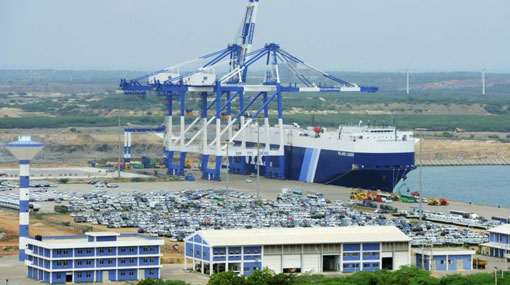Stake sale of Hambantota port : prospective debt trap or fiscal salvation?
August 17, 2017 11:49 am
The Hambantota port which was constructed in 2015 by a Chinese company with tremendous financial support from the Asian super-power has not seen the success expected by its initial investors. Many economists believe that Sri Lanka may fall deep into a debt-trap that is gradually ensnaring the Asian region.
According to DPA news agency the Hambantota port has transacted with only 44 naval vessels since its completion in 2015. As the Sri Lankan government was in no financial position to sustain the operational and maintenance costs of the port, the governing party at the time sold 70% of the port’s stake to China Merchant Port Holdings leaving a 30% stake for the Sri Lankan government.
The sale of stake is to be completed via two joint ventures that are to be implemented to administer commercial and operational activities of the port. The Sri Lankan government agreed to the terms late in July 2015 providing the Chinese firm with leeway to manage the port over a 99-year lease. To reinforce the Sri Lankan share, a provision was provided for Sri Lanka to purchase an additional 20% stake after a period of 10 years granting an equal share of 50% to both parties involved.
Many foreign financial bodies have predicted that the stake sale done by the Sri Lankan government will increase the country’s forex reserves. According to an analysis of the agreement done by Moody’s investor service there will be a major boost of investor confidence through a Chinese investment of such magnitude in Sri Lanka. It has also been stated that several Chinese investors will also be persuaded to increase investments in Sri Lanka.
Moody’s has also reported that China Merchant Port Holdings is expected to invest an additional 600 million USD to develop the surrounding area. The group will attempt to create an economic zone in close proximity to the port to maximize profit generation.
An increased influx of foreign investment would in turn provide infrastructure development. The spillage of the investment would attract private sector investors to branch out creating a more broad economic output. All the positive outcomes from this venture will help bolster the Sri Lankan credit rating which has been steadily improving since the commencement of the project.
In spite of the Hambantota stake sale providing immediate indicators of positive economic impact, several underlying factors have left many politicians and economists questioning if the increased reliance upon China will leave the country in an unplayable debt-trap.
As the current government has explicitly expressed their trepidation when dealing with the Asian giant, many questions on fiscal policy will arise as their tenure goes on. According to the Independent Singapore, Sri Lanka is in crushing financial debt with a total outstanding debt of 64 billion USD. It is also clear that debt repayment severely hampers public funding as 90% of government revenue is channeled towards debt repayment.
As Sri Lanka upgraded itself to a middle-income earning country most of the concessionary debt was cut off. This left the government with no other alternative but to obtain the Chinese loans as commercial debt. As a result, over the last decade the composition of the country’s external debt has changed dramatically, with a shift toward costlier, non-concessional debt from previously available concessionary debt. Accordingly, in 2006, only 6 percent of external debt was commercial debt, but by 2012 it exceeded 50 percent of the external debt. This has resulted in a drastic surge in interest paid on external debt, leaving the country rather vulnerable to an economic crisis.
The Hambantota port, a major portion of which was leased to China for 99 years, was one such infrastructure project financed by China and constructed during the Rajapaksa regime. It was not originally meant to be leased to Beijing, although it was constructed using debt obtained from China. However, as time went on, Sri Lanka found it difficult to pay back the loans taken from China’s ExIm Bank at the commercial interest rate for the port’s construction. There was not much return on investment from the port, similar to the fate of the Mattala airport located nearby. The low return on the projects combined with the high interest rate to be paid to the Chinese has ensnared Sri Lanka in a debt trap. The government had no option but to share the asset with the Chinese.
It is the sad truth that due to the dismal performance of the Sri Lankan export sector and the gradual decline of the West, Sri Lanka had no other alternative but to reach out to China for financial aid. The country is now at the mercy of China’s BRI (Belt Road Initiative) and will hope that it will yield favorable results.
As China is at loggerheads with India over supremacy of the orient, Sri Lanka has been unfortunately placed in the eye of the storm. Debt obtained without foresight has left the country at the feet of China. Diplomacy will have to be exercised with careful precision to ensure that Sri Lanka does not fall any deeper into the debt-trap we are currently in at present.












